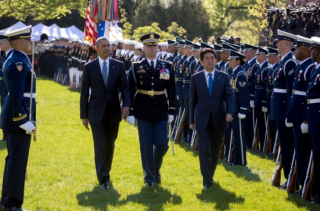Japan's New Geopolitics
If Abe's security policies and trade deals with the U.S. and Australia succeed, they will have important consequences for Japan’s security and economy.
This month could be historic for Japanese security. As Prime Minister Shinzo Abe prepares for his speech on the 70th anniversary of the end of World War II, two security reform bills make their slow and painful way through the National Diet. These two security bills, in particular, have generated numerous headlines in recent months.
To Americans and Australians, the Peace and Safety Legislative Reform Bill 平和安全法制整備法—with at least 64 combined references to the U.S. and Australian armed forces(合衆国軍隊 and オーストラリア軍隊)—is of particular interest. The bill emphasizes Japan’s shift toward greater cooperation in regional exercises with “specific” U.S. and Australian armed forces. In addition, and not surprisingly, Japan’s inaugural participation in Operation Talisman Saber 2015 with Australia and the United States occurred in the lead-up to these security bills.
But a more holistic view of Prime Minister Abe’s foreign policy agenda reveals more subtle attempts to strengthen regional ties.
An equally interesting—yet not as publicized—development is the Japan-Australia Economic Partnership Agreement or JAEPA. In January 2015, JAEPA became the first free trade agreement with a major agricultural exporter in Japan’s history. JAEPA immediately cut Australian beef import tariffs by 7 percent, an export worth $1.4 billion in trade to Australia during 2014. Other tariff cuts included 4.8 percent on lobster and 6 percent on mangoes.
This is significant considering Japan’s history of protectionism for its agricultural sector. Japanese farmers have lobbied successfully to keep tariffs high, arguing that home-grown food is vital for the island-nation’s national security. In turn, the Japanese government has banned certain agricultural imports entirely.
However, as Japan seeks stronger ties with its allies such as Australia, Prime Minister Abe has challenged these powerful farm voters by lifting trade restrictions on at least some—dairy, beef, and fruit—agricultural products. This is significant because it demonstrates Prime Minister Abe’s willingness to shake the apple cart in order to strengthen regional ties. Clearly, Prime Minister Abe has prioritized a new security posture of strong alliances to meet the growing geopolitical challenges of the Asia-Pacific.
The Guidelines for U.S.-Japan Defense Cooperation provide another example of a potential security-turned-trade partnership. Published after Prime Minister Abe’s visit to Washington in April 2015, and compared to the current security reform bills, these guidelines lay out a framework for not only stronger security ties, but trade ties between the U.S. and Japan. A section from the guidelines, titled “Bilateral Enterprise,” states:
The two governments will…facilitate reciprocal defense procurement to enhance efficient acquisition, interoperability, and defense equipment and technology cooperation; and explore opportunities for cooperation with partners on defense equipment and technology.
While the guidelines themselves do not constitute any sort of trade agreement, they do offer a roadmap of where the U.S.-Japan alliance could be heading: a defense trade cooperation treaty. Such a treaty would provide qualified U.S. and Japanese companies parties with licensing exemptions to export “defense equipment and technology,” among other defense-related systems.
Japan has never exported complete weapon systems, only occasionally exporting defense components to the United States., most recently for the Ballistic Missile Defense program in 2000 and the F-35 program in 2013. However, with licensing exemptions under a defense trade cooperation treaty, Japan and the United States could expand their bilateral trade of such weapon systems. Japan could also expand re-exports of defense components to other security partners. This could create U.S.-Japan joint defense exports and preserve the U.S. defense industrial base.
This would bode well for both U.S. and Japanese security. Japan has long been the anchor of U.S. power in Asia, and stronger security and trade ties with Japan would make up at least part of the U.S. “rebalance” to Asia. Furthermore, such a treaty would not be unprecedented. Trade agreements such as the U.S.-Australia and U.S.-U.K. defense trade cooperation treaties are already in place.
It is unclear whether a defense trade cooperation treaty could be accomplished during the current administration in Japan, but Prime Minister Abe’s confident style of diplomacy has certainly opened the door. If his security policies and trade deals with the U.S. and Australia succeed, they will have important consequences for Japan’s security and economy. Since the 1989 recession, the Japanese economy has been almost stagnant, and these new security and trade agreements may affect a much-needed change in the structure of the domestic economy. But regardless of any economic impact, Prime Minister Abe has demonstrated a multilayered and innovative approach to strengthening Japan’s security in the 21st century.
Bill Merkle is a graduate student at the University of Utah studying international law and trade policy. The views expressed in this article are solely those of the author and not the United States government or any other affiliate.
Image: Wikimedia Commons/Publica Domain

